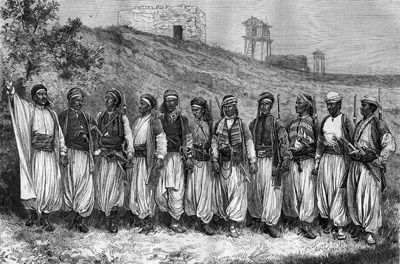This song and video have been produced in solidarity with the Egyptian youth that have died and sacrificed in the continuing revolution.
The title phrase of the song "ana mawgood" (أنا موجود) means "I am present," "I am here," or "I exist." I've translated it here in different ways depending on the context, and I've also translated it as "here I am" in some spots to give it a better sound in English. Let me know if you have any comments about the word choice.
City Band – I Am Here
I exist, but my title keeps changing
My name is youth, and I am young
I am willing to live a short life
And I am not afraid to die
Here I am
I exist, and I don’t have a card or ID
Put all your flaws on me
Throw me on the ground and stomp all over me
Keep me from making any sound
But I am here
Say that I’m spreading fitna (discord) and I am always undermining the stability
Say that I’m a kafir (infidel) and a traitor and that I’m going to hell
You are free to say what you will
I won’t object to any kind of dialogue
Yes, I’m a killer and my weapon is some stones
I am here
Here I am
Do what you want to me
And when I die, nobody ask why they killed me
And I beg you do not cry
Whoever wants to laugh can laugh, it’s not important
Nobody call out “we will not forget you”
No forget me, but don’t forget
The one who killed me is still out there
The title phrase of the song "ana mawgood" (أنا موجود) means "I am present," "I am here," or "I exist." I've translated it here in different ways depending on the context, and I've also translated it as "here I am" in some spots to give it a better sound in English. Let me know if you have any comments about the word choice.
City Band – I Am Here
I exist, but my title keeps changing
My name is youth, and I am young
I am willing to live a short life
And I am not afraid to die
Here I am
I exist, and I don’t have a card or ID
Put all your flaws on me
Throw me on the ground and stomp all over me
Keep me from making any sound
But I am here
Say that I’m spreading fitna (discord) and I am always undermining the stability
Say that I’m a kafir (infidel) and a traitor and that I’m going to hell
You are free to say what you will
I won’t object to any kind of dialogue
Yes, I’m a killer and my weapon is some stones
I am here
Here I am
Do what you want to me
And when I die, nobody ask why they killed me
And I beg you do not cry
Whoever wants to laugh can laugh, it’s not important
Nobody call out “we will not forget you”
No forget me, but don’t forget
The one who killed me is still out there
And I am gone
سيتي باند - أنا موجود
أنا موجود لكن عنوان بيتغير
أنا اسمي شباب سنه صغير
ومش رافض أعيش عمر قصير
ومش خايف أموت
أنا موجود
انا موجود لا معايا بطاقه ولا هويه
داروا عيوبكم كلها فيا
شيلوا وحطوا ودوسوا عليا
امنعوا يطلع منى الصوت
أنا موجود
وقولوا عليا بعمل فتنة وبهدم دائماً الاستقرار
وقولوا عليا كافر خاين ومكاني هيكون النار
وقولوا كلامكم بحرية أنا مش هامنع أي حوار
ايوه انا قاتل وسلاحي شوية طوب
أنا موجود
أنا موجود اعملوا فيا اللي تحبوه
ولما هاموت ما حدش يسأل ليه قتلوه
وأرجوكم ما تبكوش
اللي عايز يضحك يضحك ما يهموش
وما حدش يهتف لا ننساك لا انسوني بس ما تنسوش
اللي قتلني لسه موجود
وأنا مش موجود


